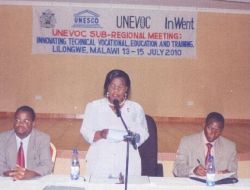
The UNESCO-UNEVOC International Centre: Who We Are | What We Do | Working With Us | Get in Touch
The UNEVOC Network: Learn About the Network | UNEVOC Network Directory
For Members: UNEVOC Centre Dashboard
Thematic Areas: Inclusion and Youth | Digital Transformation | Private Sector Engagement | SDGs and Greening TVET
Our Key Programmes & Projects: BILT: Bridging Innovation and Learning in TVET | Building TVET resilience | TVET Leadership Programme | WYSD: World Youth Skills Day
Past Activities: COVID-19 response | i-hubs project | TVET Global Forums | Virtual Conferences | YEM Knowledge Portal
Our Services & Resources: Publications | TVET Forum | TVET Country Profiles | TVETipedia Glossary | Innovative and Promising Practices | Toolkits for TVET Providers | Entrepreneurial Learning Guide
Events: Major TVET Events | UNEVOC Network News
by Emmanuel Kondowe, Malawi National Commission for UNESCO
 Malawi hosted a UNVEVOC Sub-regional Meeting on Innovating TVET, Revitalizing the UNEVOC Network and Enhancing Collaboration and Cooperation in TVET Development through UNEVOC Regional Nodal Centres from 13-15 July 2010 at Crossroads Hotel in Lilongwe, Malawi. Targeted at selected UNEVOC Centres in Southern and Eastern Africa, it was jointly organized and funded by the UNESCO-UNEVOC International Centre and Capacity Building International – InWEnt, Germany.
Malawi hosted a UNVEVOC Sub-regional Meeting on Innovating TVET, Revitalizing the UNEVOC Network and Enhancing Collaboration and Cooperation in TVET Development through UNEVOC Regional Nodal Centres from 13-15 July 2010 at Crossroads Hotel in Lilongwe, Malawi. Targeted at selected UNEVOC Centres in Southern and Eastern Africa, it was jointly organized and funded by the UNESCO-UNEVOC International Centre and Capacity Building International – InWEnt, Germany.
The objectives of the meeting were to share innovations and success stories in technical and vocational education within the region; to enhance the UNEVOC Network by establishing Regional Nodes and Centres which have capacity and drive; to get acquainted with how people in the region are innovating technical and vocational education; and to learn what Centres are doing and what their strengths are.
Opening the meeting, the Malawian Deputy Minister of Education Science and Technology, responsible for Higher Education, Mrs Otilia Moyo Jere, said technical and vocational education and training is the ‘key’ to sustainable development because of its potential to generate employment for the many youths who inundate the labour market every year from both the formal and informal education systems.
She said in view of the need to provide skills to the youth, the Ministry of Education had taken on board technical and vocational education and training in the National Education Sector Plan (NESP).
“My Ministry has responded to this need by incorporating technical, vocational education and training as one of the key pillars of the National Education Sector Plan,” said Moyo Jere.
According to the Deputy Minister, the Ministry plans to increase access to technical and vocational education and training to enable many Malawian youths acquire skills both for the employment industry and for self-employment.
She said the Youth Development Enterprise Initiative, which is an example of an initiative meant to empower the youth of Malawi, has a component whereby the youths will be trained in technical and vocational skills of their choice.
Mrs Moyo Jere emphasized the importance of networking among various TVET institutions to develop and strengthen sustainable networks to facilitate the sharing of knowledge and expertise in order to realise the Millennium Development Goals and other internationally agreed development goals and ensure survival in the knowledge society.
“The knowledge society requires technical and vocational education and training institutions need to work together through inter-disciplinary, inter-institutional collaborations at local, regional and international levels,” she said.
The Deputy Minister said this implies that TVET institutions should exploit available opportunities through the UNESCO-UNEVOC International Centre for Technical and Vocational Education and Training (UNESCO-UNEVOC) Networks to rise above academic insularity and contribute towards socio-economic transformation.
Also speaking during the official opening, the Head of the UNEVOC Networks and Officer in Charge of the UNESCO-UNEVOC International Centre in Bonn, Dr L. Efison Munjanganja, said that the constant changes in the world of work today require innovative TVET solutions.
“The constant changes that are taking place in the world of work and the world as a whole put pressure on vocational leaders and practitioners to find solutions to the innovation of TVET rapidly,” said Dr Munjanganja.
The meeting, which was coordinated by the Malawi National Commission for UNESCO, was attended by over 30 participants from Botswana, Ethiopia, Kenya, Malawi, Mauritius, Mozambique and Zimbabwe. The participants included education programme staff from National Commissions for UNESCO.
The meeting came up with a framework on the way forward on establishing and identifying UNEVOC Centres and Regional Nodes and also detailed what is required of a UNEVOC Centre in order to effectively participate in the UNEVOC Network. Dr Munjanganja and Associate Professor Trond Smistad of Akershus University College, a UNEVOC Centre in Norway, were resource persons during the meeting.
An evaluation of the meeting showed that the organisation was rated “very good to excellent” by 81% of the participants, 88% gave a rating of “very good to excellent” in terms of the objectives, while 56% of the participants gave rating of “very good to excellent” to the programme.
68% of the participants rated the papers that were presented on average as “very good to excellent” and 76% of the participants gave a rating of “very good to excellent” to the outcome.
Picture: The Deputy Minister of Education, Science and Technology, Mrs Otilia Moyo Jere, delivering her speech.
© Malawi National Commission for UNESCO